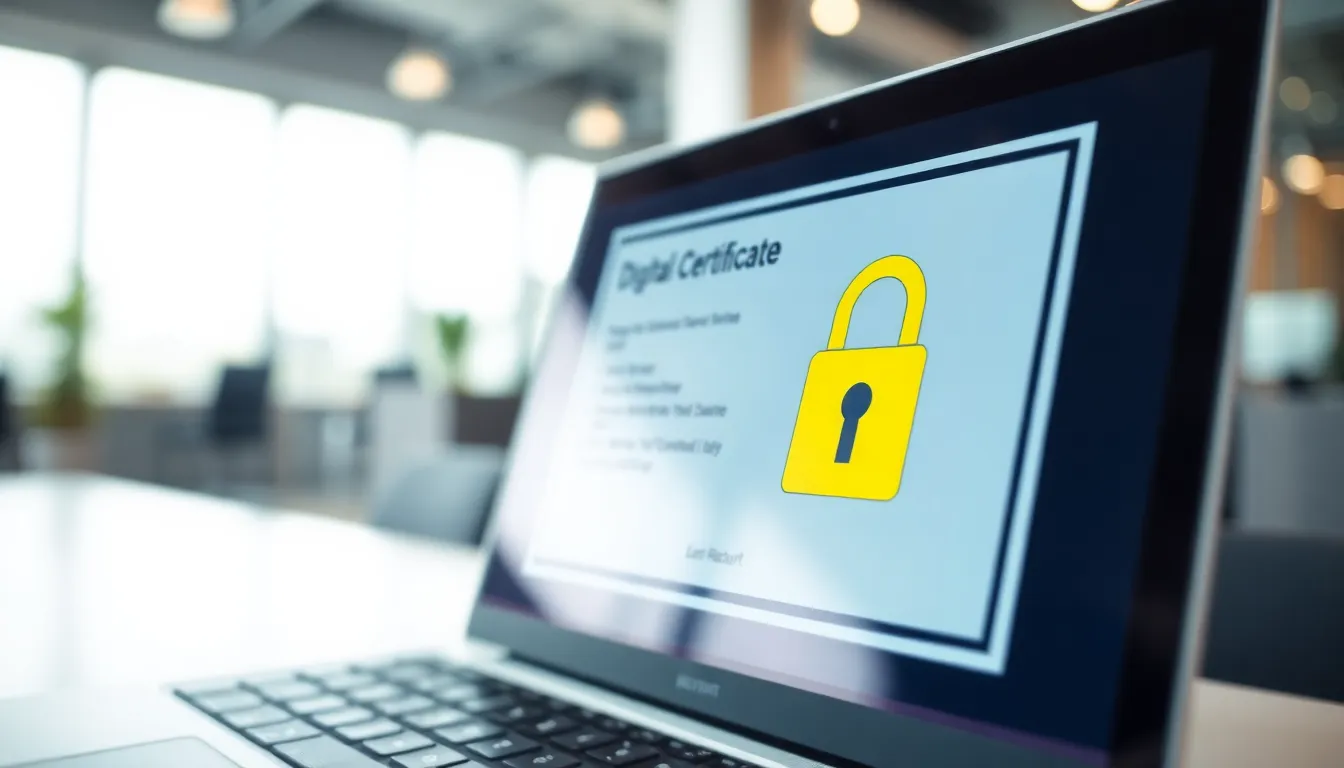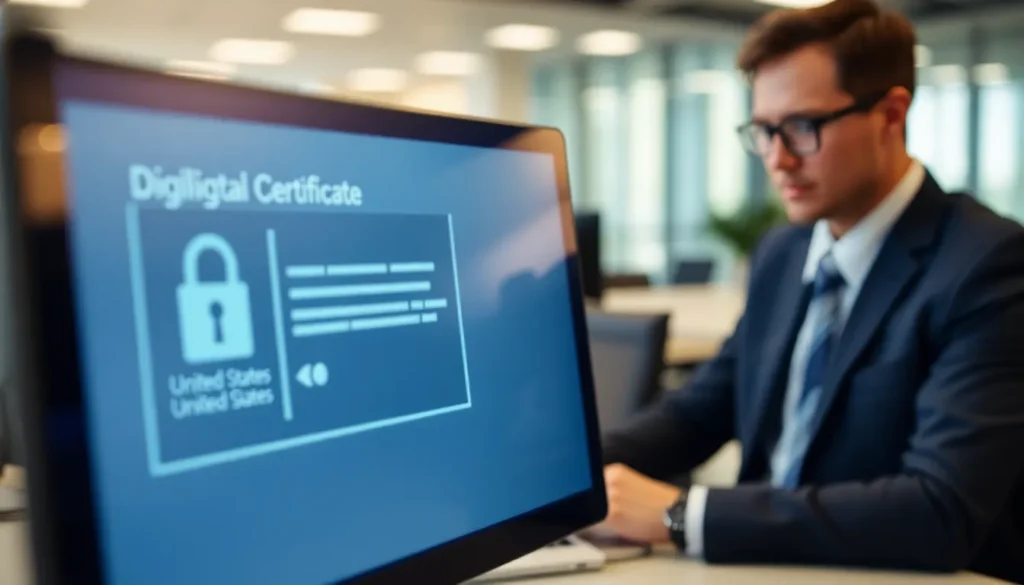Table of Contents
ToggleIn today’s digital landscape, security is more crucial than ever. With the rise of online transactions and remote communications, the need for reliable identity verification has surged. This is where digital certificates come into play, acting as essential tools for ensuring secure connections and authenticating users across the internet.
A digital certificate serves as a virtual passport, confirming the identity of an entity and enabling encrypted communication. By utilizing cryptographic techniques, these certificates protect sensitive information from unauthorized access. As organizations increasingly rely on digital solutions, understanding how digital certificates work and their importance in online security becomes vital for both businesses and consumers alike.
Understanding Digital Certificates
Digital certificates play a crucial role in establishing secure online communications and verifying identities. These certificates authenticate parties in digital transactions and protect sensitive data.
Definition of Digital Certificate
A digital certificate is an electronic document issued by a trusted entity known as a Certificate Authority (CA). It contains essential information such as the public key, the identity of the certificate holder, and the CA’s digital signature. The CA verifies the identity of the certificate holder before issuance, ensuring that the certificate can be trusted for secure communications.
Purpose of Digital Certificates
Digital certificates serve several important purposes in the digital landscape:
- Identity Verification: Digital certificates authenticate the identity of individuals, organizations, or devices, ensuring that parties involved in communication can trust each other.
- Data Encryption: Digital certificates facilitate the use of encryption methods, securing data in transit from unauthorized access.
- Integrity Assurance: Digital certificates help guarantee the integrity of the data exchanged between parties, preventing tampering during transmission.
- Non-repudiation: Digital certificates provide proof of the origin and the integrity of the transmitted data, making it difficult for senders to deny their involvement in the communication.
- Secure Online Transactions: Businesses rely on digital certificates to protect sensitive information during online transactions, fostering trust and security in e-commerce activities.
Types of Digital Certificates

Digital certificates come in various forms, each serving specific purposes in securing communications and verifying identities.
SSL/TLS Certificates
SSL (Secure Sockets Layer) and TLS (Transport Layer Security) certificates provide secure connections over the internet. They encrypt data transferred between a web server and a web browser, ensuring confidentiality and integrity. SSL/TLS certificates verify the identity of the website owner, minimizing the risk of man-in-the-middle attacks. These certificates are crucial for any website handling sensitive data, such as login credentials or payment information. Organizations often prioritize obtaining Extended Validation (EV) SSL certificates to enhance customer trust through visible indicators like the green address bar.
Code Signing Certificates
Code signing certificates authenticate the integrity and origin of software applications. Developers use these certificates to sign their code, assuring users that the software has not been tampered with since its release. By promoting trust in software distribution, code signing certificates reduce security warnings from operating systems or antivirus programs. This assurance encourages users to download and install applications without concerns about malware or unauthorized changes.
Email Certificates
Email certificates, also known as S/MIME (Secure/Multipurpose Internet Mail Extensions) certificates, encrypt and digitally sign email messages. This encryption ensures that only intended recipients can read the emails, while digital signatures verify the sender’s identity. Email certificates enhance privacy and protect sensitive communications, making them essential for organizations handling confidential information. Utilizing email certificates prevents unauthorized access and provides users with confidence in the authenticity of email interactions.
How Digital Certificates Work
Digital certificates leverage encryption to ensure secure communication between parties. They utilize complex algorithms that enable the safeguarding of sensitive information sent over the internet.
Encryption and Decryption Process
Encryption transforms data into an unreadable format, ensuring that only authorized parties can access it. The encryption process uses a public key, embedded within the digital certificate, to encode the information. Only the corresponding private key can decrypt this information, restoring it to its original form.
- Sender uses the recipient’s public key: When sending data, the sender retrieves the recipient’s public key from their digital certificate.
- Data gets encrypted: The sender encrypts the data using the recipient’s public key.
- Encrypted data is transmitted: The encrypted data travels over the internet to the recipient.
- Recipient uses their private key: Upon receiving the data, the recipient uses their private key to decrypt the information.
This process ensures that even if the data is intercepted, it remains unintelligible to unauthorized users.
Role of Certificate Authorities
Certificate Authorities (CAs) play a crucial role in establishing trust in digital certificates. CAs are third-party organizations that verify the identity of entities requesting certificates. Once verification is complete, the CA issues the digital certificate, which includes the CA’s digital signature.
- Identity verification: CAs confirm the legitimacy of the certificate holder through various validation methods.
- Certificate issuance: After validation, CAs generate the digital certificate, embedding the public key and holder’s information.
- Digital signature: CAs sign the certificate with their private key, creating a verifiable assurance of trust.
- Revocation services: CAs maintain a list of revoked certificates, ensuring that outdated or compromised certificates can no longer be used.
By serving as trusted intermediaries, CAs enhance the security of digital interactions and bolster user confidence in online communications.
Benefits of Using Digital Certificates
Digital certificates offer significant advantages for both businesses and individuals, enhancing security and fostering trust in digital transactions and communications.
Enhanced Security
Digital certificates provide robust protection for online activities by using encryption techniques. They ensure that data exchanged between parties remains confidential and secure. For example, SSL/TLS certificates encrypt data during transit, preventing unauthorized access. Digital signatures embedded within certificates verify the authenticity of the sender, reducing the risk of phishing attacks. With these security measures in place, organizations can safeguard sensitive information and mitigate potential cybersecurity threats.
Improved Trust and Reliability
Digital certificates establish a foundation of trust among users engaging in online transactions. When users see a secured connection indicated by HTTPS and a padlock symbol in their browser, they gain confidence in the legitimacy of the website. Businesses using digital certificates demonstrate their commitment to securing customer data, which can enhance their reputation. In addition, compliance with industry regulations often necessitates the use of digital certificates, reinforcing reliability and credibility.
Digital certificates are vital in today’s online environment where security is paramount. They not only authenticate identities but also facilitate secure communications and protect sensitive information. As businesses and individuals navigate the complexities of digital interactions, understanding the role and functionality of these certificates becomes essential.
By embracing digital certificates, organizations can enhance their security posture while fostering trust among users. This commitment to security not only safeguards data but also strengthens reputations in a competitive digital landscape. As reliance on online transactions grows, so does the importance of digital certificates in ensuring safe and reliable communication.






